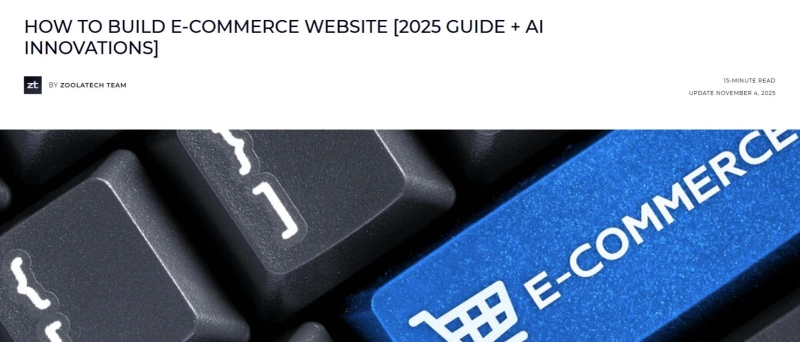In today’s digital marketplace, the success of an online business often hinges on the platform it’s built upon. The right eCommerce platform can empower your brand to scale, streamline operations, and deliver a seamless customer experience. The wrong one, however, can limit flexibility, complicate management, and stall growth.
Among the many available options, Shopify, WooCommerce, and Magento stand out as the leading platforms for modern online stores. Each offers a unique blend of functionality, customization, and scalability, making the choice highly dependent on your business’s size, goals, and resources.
In this article, we’ll take a deep dive into the key features, pros, and cons of each platform — and help you determine which one best suits your eCommerce ambitions. We’ll also touch on how professional ecommerce website development services, like those offered by Zoola, can maximize the performance and profitability of your online store.
Understanding the Importance of Choosing the Right Platform
Before diving into specifics, it’s crucial to understand why the choice of platform matters. An eCommerce platform isn’t just a technical foundation — it’s the operational core of your business. From inventory management to customer engagement and marketing automation, the platform dictates how efficiently you can run your store.
The key factors to consider include:
- Ease of Use – Can you easily manage products, orders, and content without needing extensive technical skills?
- Scalability – Will the platform grow with your business, supporting high traffic and complex operations?
- Customization – How flexible is the system when it comes to design and functionality?
- Cost – What are the upfront and recurring expenses?
- Integration – Can it connect seamlessly with your existing tools — CRMs, analytics, ERPs, and marketing platforms?
- Security – Does it provide robust protection for transactions and customer data?
Let’s evaluate Shopify, WooCommerce, and Magento through these lenses.
Shopify: Simplicity and Power in One Package
Overview
Shopify is an all-in-one hosted platform that allows you to build, launch, and manage an online store without dealing with servers, code, or complex configurations. It’s one of the most popular choices for small to medium-sized businesses — and increasingly for large enterprises with Shopify Plus.
Key Features
- Ease of Use: Shopify’s drag-and-drop interface is its strongest advantage. Even beginners can quickly set up stores, upload products, and manage sales.
- Themes and Customization: Offers a vast library of professionally designed, mobile-responsive themes. Advanced users can customize using Liquid, Shopify’s proprietary templating language.
- App Store: Over 8,000 apps extend functionality — from SEO optimization to dropshipping automation.
- Hosting and Security: Shopify provides fast, reliable cloud hosting and built-in SSL certificates for every store.
- Payment Processing: Shopify Payments simplifies transactions and supports major credit cards, Apple Pay, Google Pay, and more.
- Support: 24/7 live chat, phone, and email support ensure help is always available.
Pros of Shopify
- Quick setup and launch
- No server management or technical maintenance
- Excellent uptime and speed
- Rich ecosystem of apps and integrations
- Reliable support and community resources
Cons of Shopify
- Limited backend flexibility
- Monthly fees plus transaction charges (unless using Shopify Payments)
- Customization beyond themes often requires a developer
- Proprietary platform — less control over hosting and data
Best For:
Entrepreneurs and small to medium-sized businesses looking for a user-friendly, scalable platform that “just works” without needing deep technical expertise.
WooCommerce: WordPress Flexibility Meets eCommerce Power
Overview
WooCommerce is an open-source eCommerce plugin for WordPress, powering millions of online stores globally. It transforms a WordPress site into a full-featured eCommerce store, giving businesses incredible flexibility and control.
Key Features
- Full Ownership: Since WooCommerce is self-hosted, you own your store’s data and infrastructure.
- Customization: Endless customization possibilities thanks to WordPress themes and plugins.
- Extensions: Thousands of free and premium extensions for payment gateways, shipping, accounting, and marketing.
- SEO Capabilities: Built on WordPress, WooCommerce offers exceptional SEO control through plugins like Yoast and Rank Math.
- Developer-Friendly: Open-source architecture allows deep customization — perfect for custom ecommerce website development projects.
- Cost-Effective: The core plugin is free; you only pay for hosting, themes, and optional extensions.
Pros of WooCommerce
- Total flexibility and control
- Low initial cost
- Seamless integration with WordPress
- Strong SEO performance
- Huge community and plugin ecosystem
Cons of WooCommerce
- Requires technical knowledge or developer assistance
- You manage hosting, backups, and security
- Costs can increase with premium plugins and themes
- Performance may degrade without proper optimization
Best For:
Businesses already using WordPress or those seeking complete creative control and custom development opportunities. Ideal for content-driven eCommerce brands.
Magento (Adobe Commerce): Enterprise-Level Power and Scalability
Overview
Magento, now known as Adobe Commerce, is a powerful open-source (and enterprise) platform designed for large, complex eCommerce operations. It offers unparalleled flexibility, scalability, and performance — but also requires significant technical expertise to manage.
Key Features
- Advanced Customization: Every aspect of your store — from product catalogs to checkout processes — can be fully customized.
- Multi-Store Management: Manage multiple stores, currencies, and languages from one backend.
- Robust SEO and Marketing Tools: Includes advanced analytics, product recommendations, and promotional features.
- Performance and Scalability: Built to handle heavy traffic, large product catalogs, and enterprise-grade integrations.
- Integration with Adobe Ecosystem: Connects with Adobe Experience Cloud, Analytics, and other enterprise solutions.
Pros of Magento
- Complete control over functionality and infrastructure
- Highly scalable for large businesses
- Advanced B2B capabilities
- Excellent for global and multi-channel commerce
- Extensive developer community
Cons of Magento
- Steep learning curve
- Requires professional development and maintenance
- Hosting and infrastructure costs can be high
- Overkill for small businesses
Best For:
Mid-to-large enterprises with complex operations, high sales volume, or global reach. It’s perfect for businesses that require custom workflows, integrations, and advanced scalability.
Head-to-Head Comparison: Shopify vs WooCommerce vs Magento
FeatureShopifyWooCommerceMagento (Adobe Commerce)Ease of UseVery easyModerateComplexHostingFully hostedSelf-hostedSelf-hostedCustomizationLimitedExtensiveUnlimitedScalabilityHighModerate-HighVery highCost$29–$399/month + feesVariable (hosting, plugins)High (enterprise-grade)SecurityManaged by ShopifyUser-managedUser-managedSEO CapabilitiesGoodExcellentExcellentSupport24/7Community-basedCommunity & Adobe supportBest ForSmall to medium storesContent-driven storesLarge enterprises
How to Choose the Right One for Your Business
Choosing between Shopify, WooCommerce, and Magento isn’t about which platform is “best” in absolute terms — it’s about which aligns with your business’s needs, resources, and goals.
1. Evaluate Your Technical Expertise
If you prefer a plug-and-play approach, Shopify is your best friend. For those comfortable managing hosting or hiring a developer, WooCommerce or Magento offer far greater flexibility.
2. Consider Your Budget
WooCommerce starts inexpensive but can become costly with premium extensions and maintenance. Shopify’s predictable subscription model appeals to smaller businesses, while Magento demands significant upfront investment — justified only for large, complex operations.
3. Think About Scalability
If you anticipate rapid growth, both Shopify Plus and Magento are excellent. Magento shines for enterprise-scale needs, while Shopify Plus offers simpler management with enterprise-grade tools.
4. Assess Your Customization Needs
WooCommerce and Magento dominate here. If your store demands custom checkout flows, API integrations, or advanced product logic, choose one of these. Shopify’s app ecosystem helps, but you’ll hit customization limits sooner.
5. Evaluate Marketing and SEO
WooCommerce and Magento are naturally SEO-friendly, offering full control over meta data and URL structures. Shopify performs well but has limitations (like rigid URL formats).
The Role of Professional eCommerce Website Development
While all three platforms offer do-it-yourself options, building a store that truly converts requires strategy, UX expertise, and technical precision. That’s where professional ecommerce website development becomes invaluable.
A skilled team ensures your store isn’t just functional, but optimized for:
- Performance: Fast-loading pages and secure infrastructure.
- Conversion: Clear navigation, persuasive product pages, and seamless checkout.
- Scalability: Architecture designed to grow with your traffic and inventory.
- Brand Experience: Cohesive design that reflects your brand identity.
Partnering with experts like Zoola, a company specializing in innovative digital and eCommerce solutions, allows you to leverage advanced technologies and tailored strategies. Zoola’s developers and designers understand how to blend technical excellence with user experience — ensuring your store is not only visually appealing but also built to perform.
Whether you’re launching your first store on Shopify, migrating a WordPress site to WooCommerce, or developing a complex multi-store Magento solution, working with a professional team helps you avoid costly pitfalls and unlock your platform’s full potential.
Future-Proofing Your Online Store
eCommerce technology evolves rapidly. New payment systems, AI-driven personalization, and omnichannel strategies redefine customer expectations each year. To stay competitive:
- Choose a platform that can evolve — Shopify with its app ecosystem, WooCommerce with open-source flexibility, or Magento with enterprise integrations.
- Invest in analytics and automation — Use built-in or third-party tools to track customer behavior and personalize experiences.
- Optimize continuously — Regular performance audits and UX improvements drive long-term success.
A strategic approach to ecommerce website development — supported by experienced partners like Zoola — ensures your platform remains adaptable, efficient, and ready for future opportunities.
Final Thoughts
Your eCommerce platform is more than just software — it’s the foundation of your business.
- Choose Shopify if you want simplicity, speed, and dependable support.
- Choose WooCommerce if flexibility, content integration, and control are top priorities.
- Choose Magento (Adobe Commerce) if you’re running a large-scale, high-volume operation that demands enterprise-grade customization and scalability.
Each platform can power a successful online business when aligned with the right strategy and expertise. And with a trusted development partner like Zoola, you can transform your vision into a thriving, high-performing online store that delights customers and drives sustainable growth



